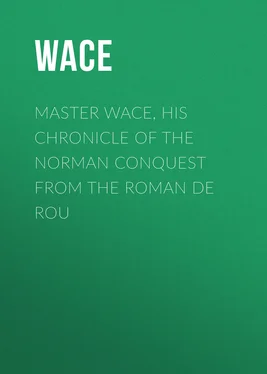Wace - Master Wace, His Chronicle of the Norman Conquest From the Roman De Rou
Здесь есть возможность читать онлайн «Wace - Master Wace, His Chronicle of the Norman Conquest From the Roman De Rou» — ознакомительный отрывок электронной книги совершенно бесплатно, а после прочтения отрывка купить полную версию. В некоторых случаях можно слушать аудио, скачать через торрент в формате fb2 и присутствует краткое содержание. Жанр: foreign_prose, История, foreign_edu, foreign_antique, на английском языке. Описание произведения, (предисловие) а так же отзывы посетителей доступны на портале библиотеки ЛибКат.
- Название:Master Wace, His Chronicle of the Norman Conquest From the Roman De Rou
- Автор:
- Жанр:
- Год:неизвестен
- ISBN:нет данных
- Рейтинг книги:4 / 5. Голосов: 1
-
Избранное:Добавить в избранное
- Отзывы:
-
Ваша оценка:
- 80
- 1
- 2
- 3
- 4
- 5
Master Wace, His Chronicle of the Norman Conquest From the Roman De Rou: краткое содержание, описание и аннотация
Предлагаем к чтению аннотацию, описание, краткое содержание или предисловие (зависит от того, что написал сам автор книги «Master Wace, His Chronicle of the Norman Conquest From the Roman De Rou»). Если вы не нашли необходимую информацию о книге — напишите в комментариях, мы постараемся отыскать её.
Master Wace, His Chronicle of the Norman Conquest From the Roman De Rou — читать онлайн ознакомительный отрывок
Ниже представлен текст книги, разбитый по страницам. Система сохранения места последней прочитанной страницы, позволяет с удобством читать онлайн бесплатно книгу «Master Wace, His Chronicle of the Norman Conquest From the Roman De Rou», без необходимости каждый раз заново искать на чём Вы остановились. Поставьте закладку, и сможете в любой момент перейти на страницу, на которой закончили чтение.
Интервал:
Закладка:
The narrative of the english expedition is the main object of the present volume: but it seemed desirable to prefix the leading passages of William's early history; not only for the purpose of introducing many of the persons with whom the reader is afterwards to become better acquainted, but with the view of exhibiting a lively picture of the difficulties attending William's opening career—of the energy with which he triumphed over his enemies, and directed his turbulent subjects to useful purposes—and of the hazards he incurred, in attempting so bold an expedition in the presence of such dangerous neighbours. The narratives of the revolt quelled at Valdesdunes, and of the affairs of Arques, Mortemer, and Varaville, are among the most picturesque and graphic portions of Wace's chronicle, and derive much interest from their bearing upon local history and description.
The division into chapters, it may be proper to observe, is a liberty taken with the original by the translator; and his further liberties are those of omitting portions of the duke's early adventures, and of restoring, in one or two cases, the proper chronological arrangement, which Wace does not always observe.
It may be asked, why the version is prose? The answer may be, that the translator's wish was to place before the english reader a literal narrative, and not to attempt the representation of a poetical curiosity; if conscious of the power of so doing, to which however he makes no pretension. To those, who wish to judge of the style and diction of the original chronicle, it is easily accessible in the Rouen edition; and occasional extracts will be given, which may answer the purpose of most readers. It was considered to be an idle attempt to pretend to represent such a work in modern english verse. In so doing, the fidelity of the narrative must have been more or less sacrificed, especially if rhyme had been attempted; and without rhyme there could hardly have been much resemblance.
The object in view has been to represent the author's narrative simply and correctly; but the printed text is obviously inaccurate, and its want of precision in grammar often creates difficulty in translation. The lapse of words, and even of lines, defects in the rhymes, and other circumstances noticed in M. Raynouard's observations, betry the inaccuracy of the MS. from which it is taken. Nevertheless, this MS.—the one of the British Museum, MS. Reg. 4. C. xi.,—appears to be, on the whole, the best of the existing transcripts. It is of the date of about 1200; its style is anglicized, the grammar loose, and parts of it are lost. It has one peculiar interest, that of having belonged to the library of Battle abbey, for which it was no doubt made; it bears the inscription, 'LIBER ABBATIÆ SANCTI MARTINI DE BELLO.'
The plan and extent of this volume did not admit of discussions concerning the many disputed historical questions as to the respective rights, wrongs, pretentions or grievances of the great rivals, whose fates were decided by the expidition. Abundant materials are now open for the English reader's judgment, in the historical works adapted to such inquiries. Wace's account, published at a norman court, and under the patronage of the conqueror's family, may be expected to represent the leading facts in light favourable to norman pretensions; but on the whole, the impression left on a perusal of his report will probably be, that it is fair, and creditable to the author's general judgment and fidelity as an historian.
Notes are appended to the text, directed mainly to local and genealogical illustrations, and particularly to that species of information which is, in a great degree, new to the english reader,—the pointing out the cradles of great norman families, whose representatives are stated to have been present at the expedition. Much of the material for this purpose was supplied in the truly valuable and interesting notes to the Rouen edition, written by M. Auguste Le Prevost, a resident antiquary of great and deserved reputation, who has also obliged the translator by additional illustrations in MS. Further information has been sought in various other quarters. The translator's wish has been to keep the branch of his work within reasonable limits; though the result may after all be, that he will be thought too diffuse on these points for the general reader, and too brief for the satisfaction of those whose pursuits lie in the direction of such inquiries. Wherever notes, borrowed substantially from M. Le Prevost, may be considered as turning on his personal or local information, his authority is cited by adding his initials, A.L.P. It was believed that all were likely to attach importance on doubtful subjects to the testimony or opinion of an active and intelligent local inquirer. But, on the other hand, the translator has not scrupled on all occasions to use his own judgment, and the assistance derived from other sources; and these have sometimes led him to different conclusions from those of his predecessors. He has particularly to acknowledge his great obligations to Mr. Stapleton, for supervision of his notes on chapters 22 and 23. Those who know the extent and accuracy of that gentleman's acquaintance with these subjects, will appreciate the great value of his assistance.
In the notes on those chapters, the translator's design has mainly been to trace the locality of the fiefs in question, and to refer to other evidence, such as that of Domesday, with regard to each holder's share in the expedition; adding, where it could be done, the state and ownership of such fiefs at the time of the compilation of the roll of Hen. II. copied into the Red book of our exchequer. The english history of these families has not been dwelt upon. Those who wish to follow up that branch of the subject, can at once refer to Dugdale's Baronage, and other authorities easily accessible. In the references to Domesday book, the obviously convenient method has been to have recourse to the very useful Introduction to that record, published in 1833, under the direction of the Record-commissioners.
In the orthography of the proper names, that of Wace has been strictly observed in the translator's text; his notes generally giving what is conceived to be the proper or more modern version of each. The necessity for this precaution is abundantly shown by the confusion and mistakes that have arisen from modernizing names, (of the true relation or derivation of which a translator is sometimes scantily informed,) without supplying at the same time the opportunity of correction, by a faithful quotation of the original. The translator here begs to express his fear lest he has in one respect violated his own rule, by the use he has made of FITZ as a prefix. It is right the reader should bear in mind, that throughout the original the term used is filz,—such as 'le filz Osber de Bretuil,' &c.; and it might have been better, by a literal translation, to have avoided the appearance of an anachronous use of the patronymic form afterwards so common.
The proper completion of the notes would consist in tracing the identity and possession of the fiefs, from the Red book roll of the exchequer down-wards, to the lists formed, after the general confiscation of the estates of king John's adherents, by Philip Augustus. The translator has only had access to the former, as to which a few words may be said. It is a beautiful transcript from a roll, a portion of which still exists, according to the report of Mr. Stapleton, in the Hotel Soubise at Paris. Ducarel has printed, though very incorrectly, a transcript from our exchequer record. 2 2 A much more correct copy is printed in the french translation of Ducarel, published in 1823.
The roll itself was probably completed between the twentieth and thirtieth years of Hen. II.; but that part of it which relates to the fees of the cathedral church of Bayeux is an abstract of an inquest of an earlier date, namely, of about 1133, taken on the death of Richard Fitz-Samson the bishop, and lately printed in the 8th vol. of the Mémoires des antiquaires de Normandie.' This circumstance creates anachronisms in the roll, that are still more apparent in the one published—also incorrectly—in Duchesne's Scriptores, from a MS. now in the King's library at Paris. The roll of Hen. II. is only the basis of Duchesne's; which was obviously compiled after the confiscations of Philip Augustus; to whose era, and the then existing state of things, the entries are made to conform. Some who have not examined into the minutise of these records, have supposed that the list, with which they close, of men who neither appeared nor made any return, refers to those who adhered to John; instead of its being, as the fact is, a mere record of defaulters under Hen. II.
Интервал:
Закладка:
Похожие книги на «Master Wace, His Chronicle of the Norman Conquest From the Roman De Rou»
Представляем Вашему вниманию похожие книги на «Master Wace, His Chronicle of the Norman Conquest From the Roman De Rou» списком для выбора. Мы отобрали схожую по названию и смыслу литературу в надежде предоставить читателям больше вариантов отыскать новые, интересные, ещё непрочитанные произведения.
Обсуждение, отзывы о книге «Master Wace, His Chronicle of the Norman Conquest From the Roman De Rou» и просто собственные мнения читателей. Оставьте ваши комментарии, напишите, что Вы думаете о произведении, его смысле или главных героях. Укажите что конкретно понравилось, а что нет, и почему Вы так считаете.












